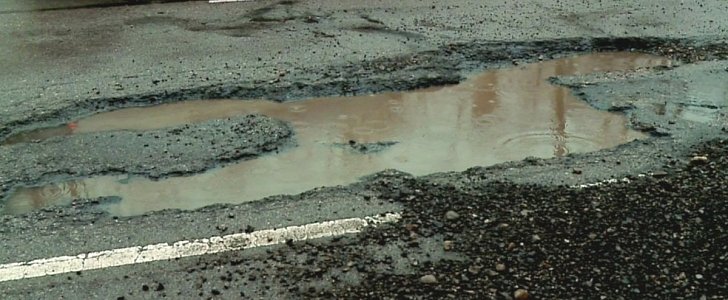The Leeds City Council is working with engineers and scientists and planning for the future. By 2050, we will have what they call “self-repairing cities,” made possible thanks to drone-mounted robots able to pave potholes in the roads in under 1 minute.
That sounds like the stuff of sci-fi movies, but the reality is that this technology is already in development, The Telegraph reports. The team is halfway through a 5-year plan that will see it being tested on the streets of Leeds.
The idea is to have drone-mounted robots scanning the roads and intervening the moment they notice the smallest cracks. Robots being robots, they will be able to work non-stop, including at hours that will ensure minimal disruption of traffic, i.e. in the dead of night, which rarely happens with human workers.
When these flying robots notice cracks in the pavement, they will analyze them and then, if need be, 3D print asphalt to fix them. The entire process will supposedly last under 1 minute and will become the basis of the so-called “self-repairing cities.”
“Our idea is that when these small cracks happen we want to be able to see them - a drone flying around the road network would see them - and another drone would land and repair them,” Professor Mark Miodownik from UCL explains. “You do it at night and we can do it in about a minute. You stop over the crack, you repair the crack and it's done. For motorways it is a different problem but for roads in Cheltenham and bigger cities, I think night-time autonomous vehicles would have almost no impact on traffic.”
“This is going to be a big future for us all. What is immediately possible now for 'self-repairing cities' is an exciting prospect in all of our lives,” the Professor adds.
He stresses that local authorities should get involved in this type of projects from the start, because of the moral and ethical implications of having robots in a city environment. For their part, they have already considered the consequences and weighed the pros and cons, with the former surpassing the latter.
The idea is to have drone-mounted robots scanning the roads and intervening the moment they notice the smallest cracks. Robots being robots, they will be able to work non-stop, including at hours that will ensure minimal disruption of traffic, i.e. in the dead of night, which rarely happens with human workers.
When these flying robots notice cracks in the pavement, they will analyze them and then, if need be, 3D print asphalt to fix them. The entire process will supposedly last under 1 minute and will become the basis of the so-called “self-repairing cities.”
“Our idea is that when these small cracks happen we want to be able to see them - a drone flying around the road network would see them - and another drone would land and repair them,” Professor Mark Miodownik from UCL explains. “You do it at night and we can do it in about a minute. You stop over the crack, you repair the crack and it's done. For motorways it is a different problem but for roads in Cheltenham and bigger cities, I think night-time autonomous vehicles would have almost no impact on traffic.”
“This is going to be a big future for us all. What is immediately possible now for 'self-repairing cities' is an exciting prospect in all of our lives,” the Professor adds.
He stresses that local authorities should get involved in this type of projects from the start, because of the moral and ethical implications of having robots in a city environment. For their part, they have already considered the consequences and weighed the pros and cons, with the former surpassing the latter.











